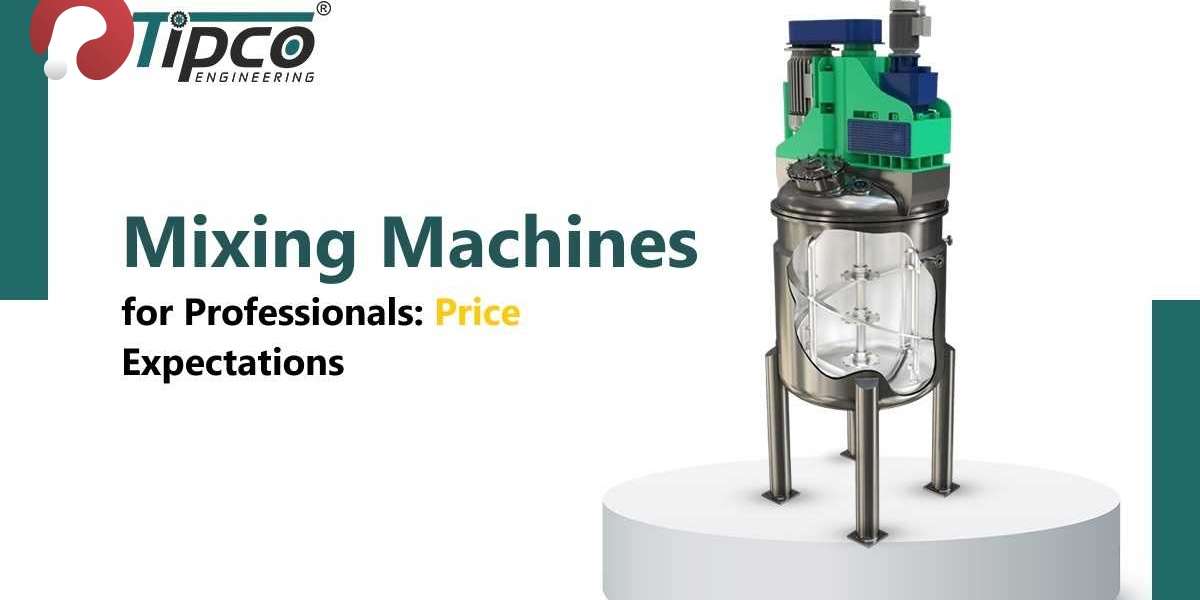In industries that require the precise blending of ingredients—whether chemicals, paints, food products, or pharmaceuticals — mixing machines are indispensable. Professional-grade mixing machines are designed to deliver consistent results on a large scale, meeting the demands of various industries.
In this guide, we’ll cover the types of mixing machines, price expectations, and what to consider when purchasing one.
Additionally, we’ll explore how companies like Tipco Engineering, a leading mixer machine manufacturer, provide high-quality solutions tailored to industrial needs.
Types of Mixing Machines for Professional Use
Before diving into price expectations, it's helpful to understand the main types of mixing machines commonly used in professional settings:
High-Shear Mixers: These mixers are ideal for emulsifying, homogenizing, and dispersing substances. Often used in chemical and pharmaceutical industries, they provide precise and rapid mixing.
Ribbon Blenders: Known for their effectiveness in mixing dry powders and granules, ribbon blenders are frequently utilized in food processing and other bulk material applications.
Planetary Mixers: Used in applications that require thorough mixing of viscous substances, planetary mixers are commonly seen in the food and cosmetic industries.
Plough Shear Mixers: Designed for high-intensity mixing of dry powders, these mixers are often employed in industries where thorough blending of dry substances is essential.
Key Factors Affecting Mixing Machines Price
When evaluating prices, keep in mind the factors that influence the cost of industrial mixer machines.
Prices for these machines vary widely depending on the following elements:
- Machine Type and Specifications
The complexity of the mixing machine type directly impacts its price. High-shear mixers and planetary mixers, which require advanced technology, tend to be more expensive than simpler models like ribbon blenders.
- Capacity and Size
Machines with larger capacities cost more due to the additional materials and power requirements needed to handle greater volumes. For example, a 200-liter mixer will be pricier than a 50-liter model.
- Material of Construction
Mixers made from durable materials, such as stainless steel, which is resistant to corrosion and easy to clean, typically cost more than those made from other materials. This is especially true for machines used in the food and pharmaceutical industries, where hygiene is paramount.
- Level of Automation
Some machines come with automated features, such as digital control panels, variable speed options, and automatic discharging systems. While these features can enhance efficiency and ease of operation, they add to the overall cost.
- Brand Reputation
Well-established brands known for quality, durability, and customer support tend to have higher prices. However, investing in a reputable brand like Tipco Engineering can pay off in terms of machine longevity and reliability.
Typical Price Range for Mixing Machines
Here’s an overview of price expectations for various types of mixing machines:
High-Shear Mixers: These machines can range from $2,000 to $10,000, depending on capacity and specifications.
Ribbon Blenders: Priced between $1,500 and $5,000, depending on size and additional features.
Planetary Mixers: Prices vary from $3,000 to $15,000, especially for models with automated functions and high capacity.
Plough Shear Mixers: Typically range from $5,000 to $20,000, depending on customization and build quality.
Choosing the Best Mixing Machine for Your Needs
To select the best mixing machine, consider your production volume, the types of materials being mixed, and the specific features that would enhance your workflow.
Some businesses may benefit from investing in a high-shear mixer with automated features for batch consistency, while others may need a reliable ribbon blender for dry powders.
Tipco Engineering: Your Trusted Mixer Machine Manufacturer
When it comes to professional-grade mixing machines, Tipco Engineering stands out as a reliable and innovative manufacturer. They specialize in designing industrial mixer machines that cater to various industries, including the chemical, food, and pharmaceutical sectors.
Tipco Engineering prioritizes quality, ensuring that every machine is crafted to meet high standards of durability and performance.
Why Choose Tipco Engineering?
- Custom Solutions: Tipco offers tailored solutions to fit unique production needs, helping clients find the perfect machine for their requirements.
- Durable Construction: Tipco’s machines are built with premium materials for longevity, minimizing downtime and maintenance costs.
- Advanced Features: From automated control systems to safety-enhanced designs, Tipco provides state-of-the-art features that enhance efficiency.
- Competitive Pricing: Despite their high-quality offerings, Tipco Engineering provides mixing machines at competitive prices, making them an ideal choice for both large-scale operations and small businesses.
Conclusion: Investing in Quality Mixing Machines
Selecting the right mixing machine is a significant decision that affects the efficiency and quality of your production. While the initial cost may vary, investing in a durable, high-quality machine from a reputable manufacturer like Tipco Engineering can ultimately lead to long-term savings and improved productivity.
By considering your specific needs, budget, and desired features, you can find a mixing machine that aligns perfectly with your professional requirements.
Also read: Precision Mixing: Navigating Mixing Machine Price in India














